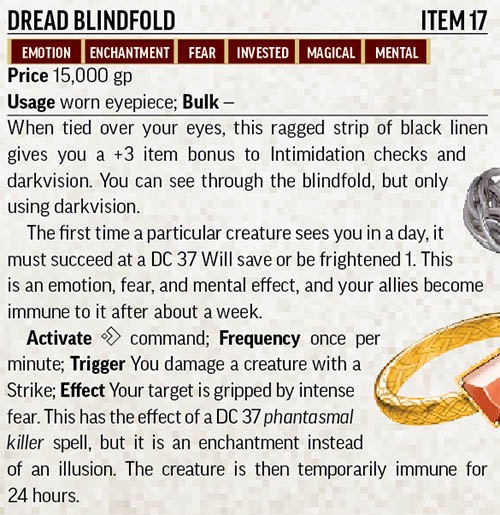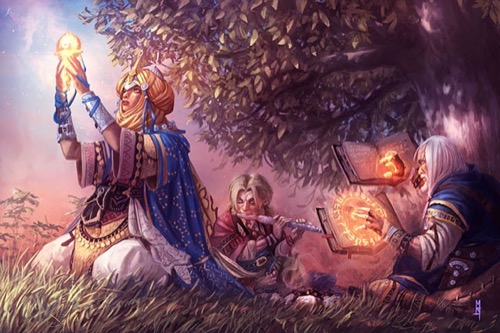Last week, we built a character together, so now let's talk about how the game plays!
Exploring
Most of the time when you're adventuring, you're exploring. Whether you're examining a dusty tomb, blazing trails through a dense jungle, or disguising your way into an enemy fortress, exploration is all about discovery. It takes place on a fluid time scale, ranging from roughly 10 minutes to hours, or even days for a long overland expedition. It's dangerous to go alone, especially when you don't know if you'll have an important skill you need to brave the perils of a dungeon, but fortunately you'll be part of a team. If you're an expert or better in a skill, you'll be able to help your allies with that skill while exploring, by coaching your less athletic teammates up the cliffside and spotting the worst of the climb, using hand gestures to sneak your louder allies past the guards at the best moment, and more!
In addition to a handful of exploration actions characters can take while in this game mode, the book also presents a number of skills that can be used while exploring.
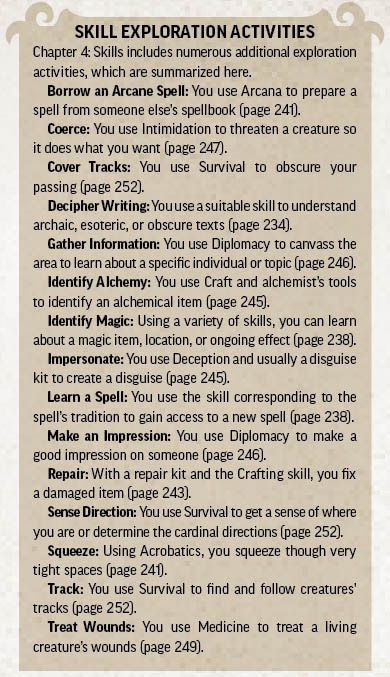
Encounter
When every action matters, your characters enter an encounter, proceeding turn by turn, action by action. These crop up in the middle of exploration, putting your travels on hold so you can deal with an immediate danger or opportunity. Combat encounters are the most typical encounters, taking place on a scale of mere seconds between life and death, but all encounters share a common structure: you roll initiative to determine turn order, then you take turns, performing your actions and determining what happens. In a combat encounter, each turn you get one reaction and three actions you can spend however you want. For instance, on her turn in combat, a sorcerer might spend all three actions to unleash a deadly barrage of magic missiles while a fighter might raise his shield and then use a Sudden Charge to rush an enemy and attack.
It's during encounters that most player characters will bestow conditions upon their foes, or gain a condition as the result of the conflict. To make the wide range of conditions that can come into play easier for new players to learn, we provide a full-page list of them without any of the associated rules. This allows someone to quickly reference what it means to be stunned or stupefied, and tell the difference between being undetected, invisible, or concealed.
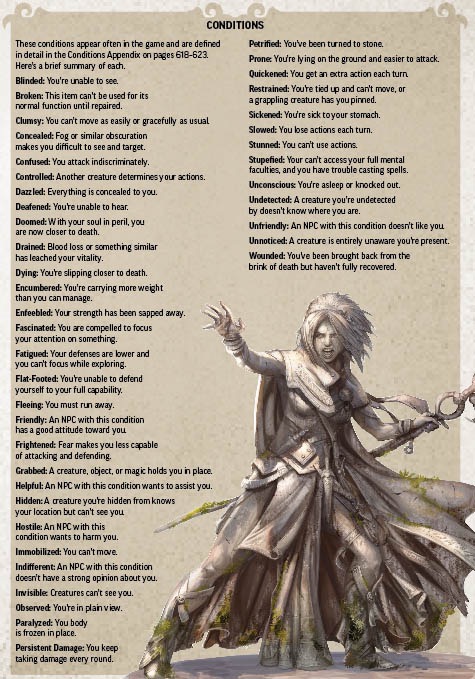
Downtime
Even heroes sometimes need a break from the incredible stress of an adventuring life! During downtime, you can earn money, craft items, swap out old character choices for different options, or just take a rest and carouse with the locals. You take your downtime when you return to the safety of a town or home base, usually after completing an adventure. While downtime in general flows quickly through days or weeks at a time, depending on the choices you make, new options might open themselves up to you as the GM sprinkles special downtime events into your chosen downtime activity, zooming in temporarily to highlight interesting or unusual occurrences when you're not out on an adventure.
Downtime gets the least amount of space of the three game modes, but it's an incredibly rich design space built into the core of the game that may lead to new innovations over the lifespan of Second Edition (some of which we're already working on). As in Exploration Mode, players can utilize some of their skills for downtime activities.
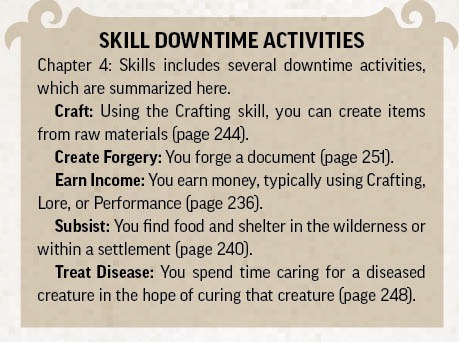
Treasure
While many adventurers risk their lives due to heroism or a sense of duty, treasure is a major motivator for others. And let's be honest, even when playing an altruistic PC, it's still a lot of fun to find a cool magic item for your character. In Pathfinder, your characters will find a fairly steady stream of magic items, ranging from simple healing potions to the mighty skyhammer. Some of the more inexpensive items are consumable, meaning they can be used once, like alchemical elixirs you drink, scrolls you read, and special talismans you can attach to your other items. Others, like magic weapons or enchanted clothing and tools, serve you again and again as you adventure. You could wield a storm flash rapier arcing with electricity and wear a dread blindfold to strike fear into your foes! You can also find magic runes you can etch onto weapons and armor to build all kinds of powerful combinations!
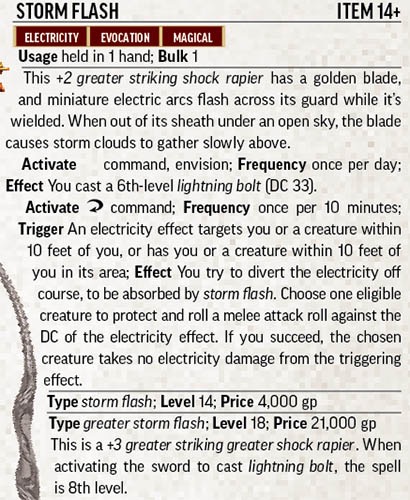
Experience Points and Levels
In Pathfinder, you learn from your adventures, both your triumphs and your failures, growing more powerful and gaining fantastic new abilities. We measure that progress with Experience Points (XP), and typically the more impressive and insurmountable the challenge for your character, the more XP you gain for overcoming it. Once you earn a total of 1,000 XP, you reach a new level, opening up new options for your character. Next week we'll go into detail about leveling up!
Mark Seifter
Designer
The Play's the Thing
Monday, July 8, 2019


